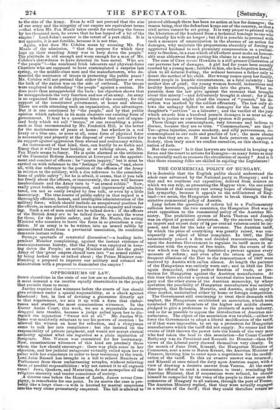OPPROBRIUMS OF LAW.
SOME absurdities in the state of our law are so discreditable, that it must demand a vis inertice equally discreditable in the people that permits them to recur.
Justice requires that witnesses before the courts of law should give evidence under a special responsibility, as a check against falsehood ; but, in lieu of devising a guarantee directly apt to that requirement, we mix it up with a form that embar- rasses and startles the most conscientious witnesses. In the Exeter Assize Court, this week, we see a respectable matron dragged into trouble, because a judge called upon her to dis- regard the injunction "Swear not at all." Mr. Justice Wil- liams was manifestly reluctant to use his powers of coercion : he allowed the witness an hour for reflection, and a clergyman came to talk her into compliance : but she insisted on the responsibility of private judgment, and would not accept clerical authority against what she regarded as a plain injunction of Scripture. Mrs. Watson was committed for her contumacy. Now, conscientious witnesses of this kind are precisely those whom the law should encourage : there was plain sense in her objection, and her judicial antagonist virtually called upon her to palter with her conscience in order to bear testimony to the truth. Lord John Russell has brought in a• bill to relieve Members of Parliament from these embarrassing scruples, without relieving them of needful responsibilities : why not extend it to all cognate cases? Jews, Quakers, and Moravians, do not monopolize all the religious sincerity and tender conscience of society.
A divorce case before the House of Lords, James versus Cres- pigny, is remarkable for one point. In its merits the case is pro- bably like a large class—a wife is hurried by marital suspicions into the very crime prematurely suspected. The bill is allowed to proceed although there has been no action at law for damages ; the reason being, that the defendant keeps out of the country, so that a civil action cannot be set going. It is very proper to proceed with the liberation of the husband from a technical bondage to one who is virtually his wife no longer ; but if it is possible, to proceed with such a measure of emancipation in the absence of an action for damages, why maintain the preposterous absurdity of forcing an aggrieved husband to seek pecuniary compensation as a prelimi. nary to freedom, in a case which dell others must make an honour- able man abhorrent from putting his claims in a moneyed form?
The case of Cave versus Howkins is a still grosser illustration of our perverse law of damages. A girl had for years been secretly courted by a young man ; faithful to him, she has forgotten herself; alien to all natural feeling, the seducer becomes a father only to desert the mother of his child. Her wrong comes upon her family, decent people in humble circumstances, as a fatal calamity : her mother dies of grief; the young woman herself, industrious and healthy heretofore, gradually sinks into the grave. What re- paration does the law give against the recreant that brought about this misery 7—and deliberately brought it about; for if his original trespass might plead the excuse of "passion," his de- sertion was marked by the coldest effrontery. The law only al- lows the unhappy father to seek damages for the loss of his daughter's "services" as a labourer ; and the verdict of the jury which awards him a hundred pounds damages is as near an ap- proach to justice as our blessed legal system will permit. These things are commonplaces, very tiresome and tedious to discuss, because they are so trite. "Commonplaces," are they? Yes—gross injustice, coarse mockery, and silly perverseness, are commonplaces in our code and practice of law ; the more shame to us that they are so. If none but fools persevere in approved foolery, then truly must we confess ourselves, on this showing, a nation of fools.
But the reason ? Is it that lawyers are interested in keeping up forms and the resort to actions for damages—as many forms as may be, especially such as promote the circulation of money ? And is it that these cunning folks are skilled in cajoling the Legislature?


























 Previous page
Previous page